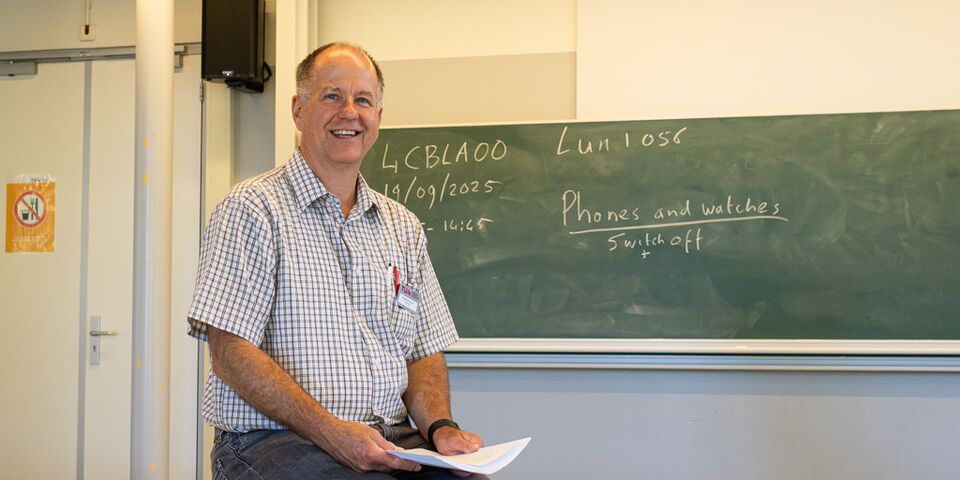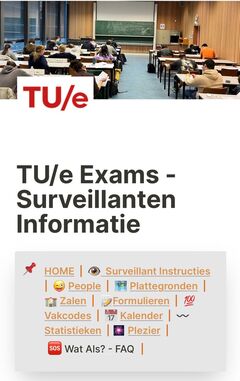Behind the Scenes | Roelof de Gruyter, exam proctor
From technicians to schedulers, and from IT specialists to catering staff – it takes many hands to keep TU/e running smoothly. But who are the people behind the scenes? Cursor puts them in the spotlight. This time: Roelof de Gruyter, one of TU/e’s exam proctors.
Roelof de Gruyter first heard about proctoring through acquaintances, and he was immediately enthusiastic. Two years later, he has become an indispensable member of TU/e’s proctoring team. “I really enjoy it; it’s become my passion,” he says. In fact, he loves it so much that he recently started proctoring in two different places – here at TU/e and at the national state exams.
What time do you clock in?
“That depends on the exam. The earliest ones start at nine in the morning and the latest at six in the evening. As a proctor, I have to arrive a bit earlier to get everything ready. For written exams, that’s usually half an hour in advance, but for digital exams I come in even earlier because we sometimes have to collect loan laptops, for example.”
What does your job involve?
“My two main tasks are making sure that exams run smoothly and according to schedule, and of course keeping an eye out so students don’t cheat.”
“Making sure everything goes smoothly involves a lot of small tasks. Before the exam, we proctors ensure all materials are in place — such as scrap paper, attendance cards, pens, and, for digital exams, loan laptops or USB sticks with special software.”
“During the exam, we start by checking everyone’s ID, collecting attendance cards, handing out scrap paper, and explaining the rules: no talking, phones switched off, no lending items, bags on the floor, and so on.”
“Once the exam has started, we answer students’ procedural questions — for example about timing or how to fill out a form. The rest of the time we walk around and stay alert to make sure no one is cheating or using their own notes. If I suspect students are copying or helping each other, I sometimes separate them. We also have to report these kinds of incidents afterward.”
How did you end up in this job?
“A few years ago, a friend from my old scouting group told me that he sometimes worked as a proctor at TU/e. I found that immediately interesting. I’ve had my own IT company for over seventeen years, but since COVID, everything has become more digital — fewer on-site meetings and more time behind a screen. So I was looking for something on the side that involved more personal interaction.”
What do you enjoy most about your job?
“I really like that I can use my IT expertise during proctoring as well. In some digital exams, students have to boot the exam software from a USB stick, outside of Windows or macOS. That can sometimes go wrong. There are special digital coaches to handle those issues, but thanks to my background, I can often help too — and I enjoy that.”
I find the large exams more challenging. You’re there with about three hundred students and several proctors in a big sports hall
“And beyond that, I just enjoy working with people — both my fellow proctors and the students. I really feel that we’re appreciated. Not long ago, a student even came up to me in the city and said, ‘Thanks for always being so kind during exams. You probably don’t get thanked very often, so I just wanted to say it.’ That was really nice to hear.”
And the least fun part?
“For very small exams with only a handful of students, there’s less to do as a proctor. Then a three-hour exam can suddenly feel very long.”
“I personally find the large exams more challenging. You’re there with about three hundred students and several proctors in a big sports hall at the sports center. One student needs to speak to the subject expert, another needs extra scrap paper, another has to be escorted to the restroom — you’re constantly busy.”
You developed a special proctoring app. How did that come about?
“That’s right. As a proctor at TU/e, you get a lot of information — constantly changing exams, buildings, and rooms. To make it all more manageable, I built an app in my own time. At first it was just for myself, but so many other proctors were interested that it’s now become an official app, which I maintain.”
“In it, my colleagues and I can find all sorts of information: lists of course codes, photos of all proctors, a campus map — including videos showing the fastest indoor and outdoor routes — and all nearby dining options.”
What time do you clock out?
“That depends on how many exams I’m scheduled for that day. Sometimes I only proctor one exam, other times several. Most exams last three hours, so if I’m working an evening exam, it usually runs until around nine p.m. Some students get extra time, which adds another half hour. And then, of course, we still have to clean up afterward — so it can easily be ten o’clock.”
“Sometimes during these late exams, security gets a little overzealous and locks everything up too early. Or we have to return materials after the exam and suddenly the lights go out.”
What do you do once you’ve clocked out?
“On exam days, I usually go straight home. I then update my notes about that day’s exam — things like time, location, and any special details. If I’m proctoring again the next day, I check before going to bed to see if anything has changed. And sometimes I still have to take care of something for my IT company.”
“As for hobbies, I love flying drones. I often do that with others through special drone clubs. I combine flying with photography and videography, and afterward I edit the footage.”
This article was translated using AI-assisted tools and reviewed by an editor



Discussion